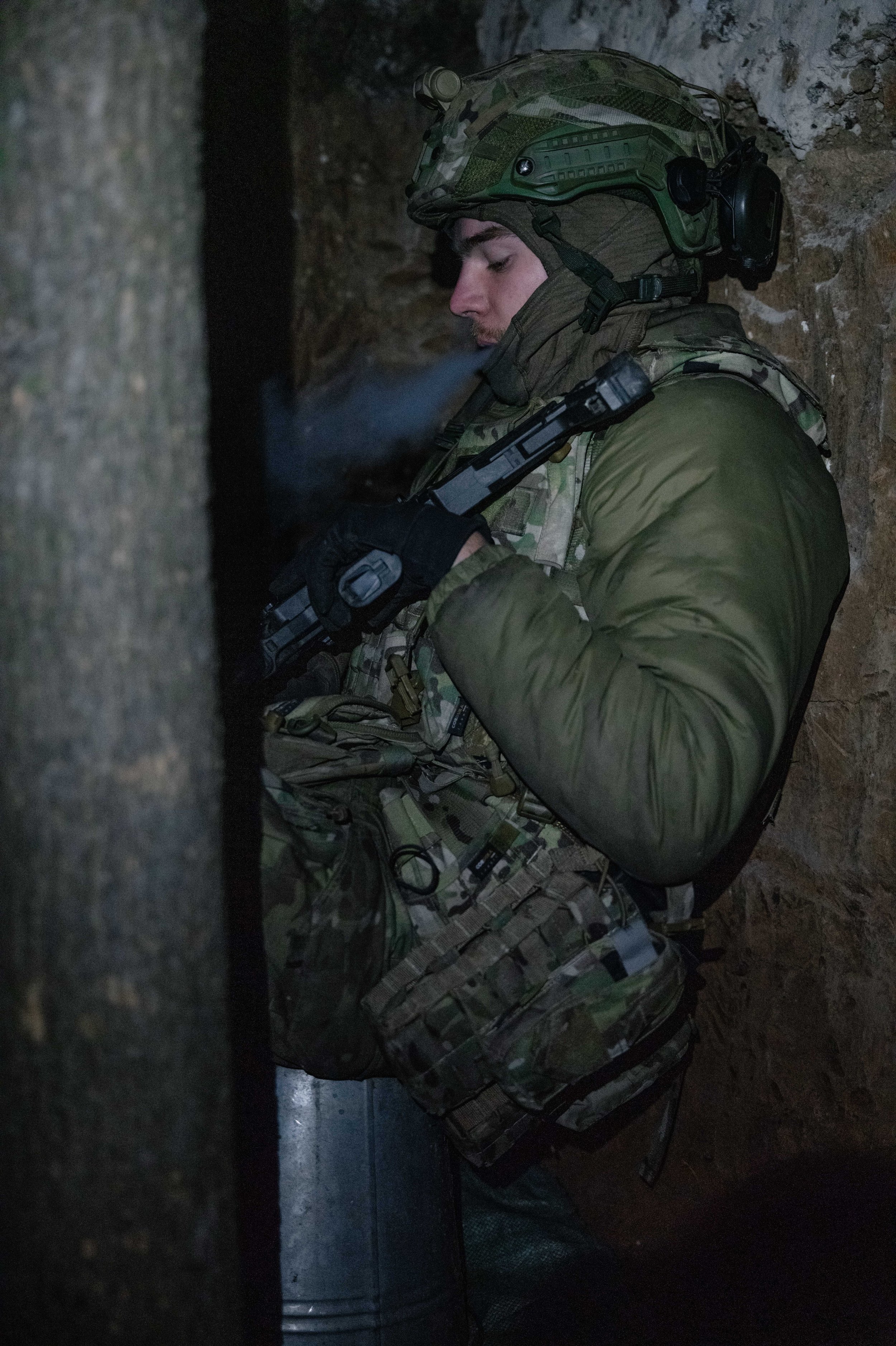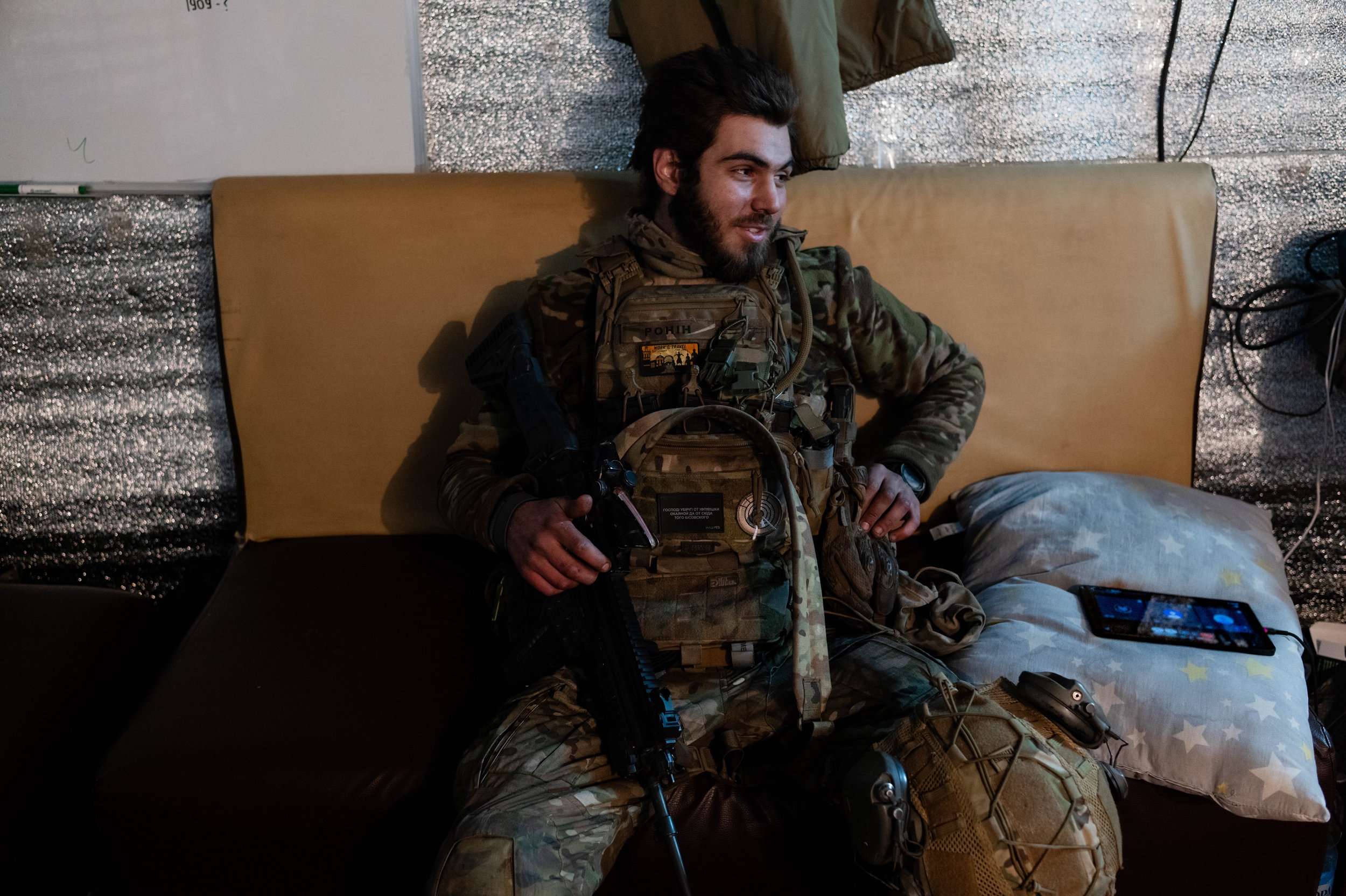24 Hours On The Front: A Fight In All Directions
Watch / Listen: Apple or Spotify
Davinci Wolves Battalion
Date of reporting 10/11/24-13/11/24
Donetsk, Ukraine
Bouncing in the back of a Land Cruiser speeding towards the trench lines of Ukraines Eastern front Martin is the first soldier I've met in 3 years here without a nickname. It’s his first day on the front, and he is headed to the first line of trenches. At 5’ 4’’ with rimless glasses fogging in the cold, I expect it wont be long before he is given one.
Martins first day in the trenches will be nearly the 1000th day of the full scale Russian Invasion. The tedium and terror of it is shared by 2.2 million Ukrainian soldiers spread across the more than 600 mile frontline, where the trenches and artillery of WWI meet the new horrors of drone warfare. Soldiering here has been largely reduced to a profession of luck, and survival to an equation of time. Yet of all the new drones, and old artillery, the inescapable cold of Ukraine’s winter remains the most constant, unyielding adversary.
The Land Cruiser skids to a halt on icy gravel, the total dark is punctuated by the red glow of headlamps, hands heave out of the dark and pull us, and crates of ammunition inside a derelict factory. The red flashlights do nothing to illuminate the wreckage strewn interior, the soldiers of The Davinci’s Wolves Brigade hustle us along, keeping us on a narrow path. Martin disappears down a corridor, destined 50m farther towards the Russian lines.
My eyes adjust to the darkness enough to make out the one undamaged room in the building. Lit by a single headlamp nailed to a wall, it’s light is just enough to discern 3 improvised cots, 4 men, 1 tiny camp stove. “Ronan” a towering soldier from the Davinci’s Wolves Brigade offers me a gas mask. I ask him if the Russians have used gas, he nods, “Litovitz” the squads youngest member, translates: “Last week they dropped gas on a position with a drone”.
“Ronan” picks up a GP-34 grenade launcher modified with a stock and walks through the dark to a hole in the east facing wall. He levels a thermal scope to his eye. An iPhone cable dangles from the scope, to his uniform, where warmed by body heat an external battery is struggling against the freezing cold.
Through the hole “Ronan” picks out the white thermal silhouette of a man on the Russian lines 248 meters away.“Ronan” parlays what he sees in his thermal scope to the pendulum sights of his grenade launcher in the dark. He alternates between the thermal sight and the grenade launcher several times, a pause, then: “THNKKK” his 40mm grenade arcs into the night. Ronan withdraws quickly, winding his way through debris and tripwires.
“Ronan” retreats to a command position where “Bach” is manning the radios. He has just squated down by the camp stove when there is a sudden whirring noise. A violent explosion jars the adjacent room, the camp stove flutters. “Joshka” sleeping in the corner wakes agitated. “Drone?!” I ask “Litovitz” replies in a harsh, forced whisper “Shelter!”.
We clamber down a hole hacked through the foundation into the freezing earth. Inside there is a bucket, two military rations, no light, and not enough room to stand. Within a few minuets the cold dirt has set “Litovitz’s” teeth chattering.
When we emerge from the dugout “Joshka” is already asleep in an oily sleeping bag. The remainder of the night is quiet, the artillery distant, and machine gun fire laconic. “Litovitz” offers me a sleeping bag on a wooden pallet “it smells like shit, but it is warm” he says.
The morning arrives without dawn, the position offers no natural light. “Joshka” and “Bach” check the damage from last nights attack. Sunlight blazes through holes in the ceiling left by artillery, shocking eyes accustomed to dark. The pooled sunlight radiates rare warmth, and “Bach” pauses in the rays, crouching, inhaling eyes closed, then opening them finding debris from last night’s explosion. Amongst the debris is a homemade bomb that failed to detonate, and finally 3 feet further, an un-exploded mortar.
In the dim morning light the 4 men strike me as a different breed from the Ukrainian fighting men Iv’e come to know. All are volunteers, all are fit.“Joshka” may be the squads “Old Man” but at 33 he is 7 years younger than the average Ukrainian soldier. Their uniforms and equipment are a departure too, high quality and privately purchased. New CZ Bren II rifles, seen mostly in special forces units are cradled in capable arms, each featuring optics, a rare sight in Ukraine.
Daily life on the front takes the shape of a fight in all directions, in millimeters, and degrees, against the Russians to the east and the cold everywhere else. Two of the Wolves take watch, a 3rd rests, the 4th digs in deeper, re-enforces, mends. “Joshka” Is working on the shelter, for 3 hours he hacks away at the icy earth with trench shovel, pick and ax. 5 days of work have yielded him a dugout just large enough for the positions 4 men to wait out a barrage. His labor, like most of the hushed conversation here is punctuated by coughing fits. “Bach” brings the dirt out by bucket and fills the sandbags to shore up their positions walls against attack. The thin walls illusion of safety would not hold out against even light machine gun fire.
Even at the peak of the day, the thermometer barely scratches 0. For heat they have 3 cats, a dog, and trench candles they conceal inside a covered camp stove. The candles unfiltered light could bring the enemy on them, but it’s heat is of little consequence even to the men huddled around it.
The dog, mangy and tail tucked is deaf from explosions, and nearly blind in the perpetual darkness. It spends most of its days underneath the radio desk next to the camp stove. It’s other favorite location is underfoot. The dog trails the soldiers every movement, separated it instantly begins to scratch and whimper.
Diverting the smoke from the tiny candle lit stove requires a lengthy exhaust system that is another chore to maintain. If they lose what little heat they have hypothermia can set in. On the frontline, evacuation for hypothermia, as for an artillery wound, is only possible at great risk and by night. Medical vehicles are a favorite target of the Russians, and often casualties must survive for multiple days to be extracted at all.
The sound of artillery, overhead drones, and machine guns fire intensifies with the rising sun. The temperature does not. “Bach” works repairing the exhaust pipe for the camp stove, it’s leaking now and acrid smoke builds in the windowless room. The stove dies and total dark accompanied by a damper cold sets in. In an hour he has repaired it, and now begins making more trench candles, combining coiled cardboard with wax in empty soup tins.
Radios connect the position to the isolated trenches nearby, and with every strike on the trenches the squad checks in for casualties. A long silence following a strike is deafening.
A hurried voice breaks over the radio, bringing the squad to arms “There is an armored vehicle, maybe Russian” “Litivotizs” says. The soviet style BRDM could belong to either side, and with its canon and position on a hill crest could bring destruction to both. The Ukrainian lines brace, and wait.
The armored vehicle retreats, not long after there is a sharp swoosh and a nearby explosion. The Wolves seem unperturbed. A minuet passes and another whoosh, and impact, this time closer. A Ukrainian drone overhead relays video of the strike, nearby. “Probably its MLRS (multiple launch rocket)…maybe a tank” says “Litovitz” another Woosh, this time shaking the position. Two of the wolves take to fighting positions, “Litovitz” joins me in the shelter, eyeing the ladder as the dust of another strike loosens. After the 6th round there are 10 minutes of silence, cautiously the squad resumes its tasks.
No sooner have they begun than an impact echoes from the opposite side of the position.
We scramble back to the shelter . “Litovitz” has a shocked grin, eyes wide. At 22 he is the youngest in the squad. Waiting for the next impact “Litovitz” looks lovingly at his rifle. Is he worried? “I worry for my friends. I feel..I will make it through this war.…” He continues, looking up at the shelters entrance “…but If I make it home how can I find myself in a civilian life?”. Another rockets lands, the closest yet. The next seems like it could hit us directly.
It impacts no closer than the last.
Subsequent rockets now impact farther away with each volley. After 5 minuets of silence we leave the shelter. The mangy dog is still cowering under the radio desk, silent throughout.
The setting of the sun is only perceptible as a deeper cold seeping into the position, the explosions now boom more sonorously in the clammy night air. The men wrap themselves up, yet in a few hours their bodies yield to shaking. Gun barrels become bitting cold, rations and tea are heated, two of the men pluck up cats and wriggle into filthy sleeping bags. The mangy dog has no takers and crawls under an occupied cot.
Hours pass and the radio traffic brings the men to arms again. There is a muted commotion at the perimeter, and first one, then two well built youth arrive. They are without winter layers and sweating profusely, red flashlights illuminate mist curling from under their body armor. Unloading heavy packs someone asks if they heard any drones. Each man has crossed the no mans land between positions alone, hoping to avoid drone detection, and failing that, multiple casualties.
One of the newly arrived Wolves inquires with a harsh whisper, looking around the positions dim corners. A hand points to a sleeping bag. He leans over the barricade built around the sleeping bag. He nudges “Bach”, a muted whisper, arms shoot up into the darkness and the two soldiers embrace, locking arms in exclamations forced to a hush. The two friends have not seen each other in 5 days, a lifetime on this front.
Amplifying the nights anxiety a vehicle extraction is planned. Vehicles draw the attention of drones, both to the vehicle and positions. Driving off-road it’s impossible to match the 60mph speed of a drone. None the less men must be rotated on and off the line, supplies replenished and casualties evacuated.
Men and munitions are staged carefully, rigged to be moved as efficiently as possible, as quietly as conceivable and in total darkness. The men crouch in the dark, hands on bags of supplies. A warning crackles on the radio and the distant engines reverberate. A sound of crunching gravel, squeaking brakes. Sprinting out into the dark the soldiers throw aside the Land Cruiser’s troop doors and slide supplies in. The men jump in last, no time for seats they pile onto the equipment and slam the doors shut. The cruiser hurtles into the night, “Ronin” looks down at the piles of ammunition and explosives beneath him and makes exaggerated eyes at them, at least it will be over quickly he seems to say.
In another 30 minuets his 17 day tour on the Eastern front will be over and the wars 894th day will have just begun.

























